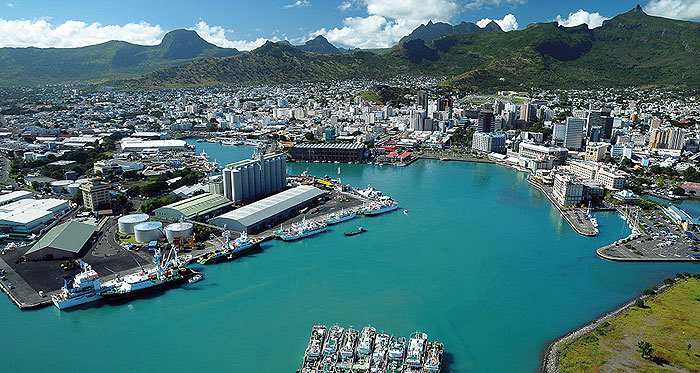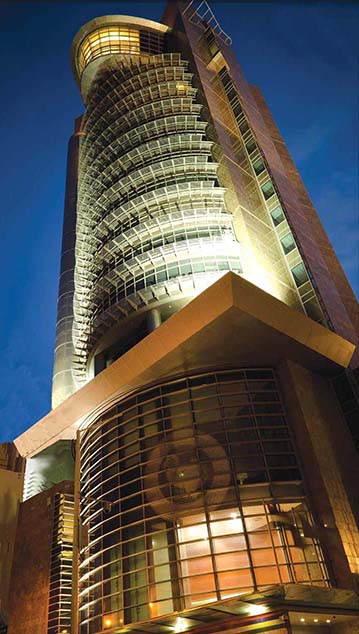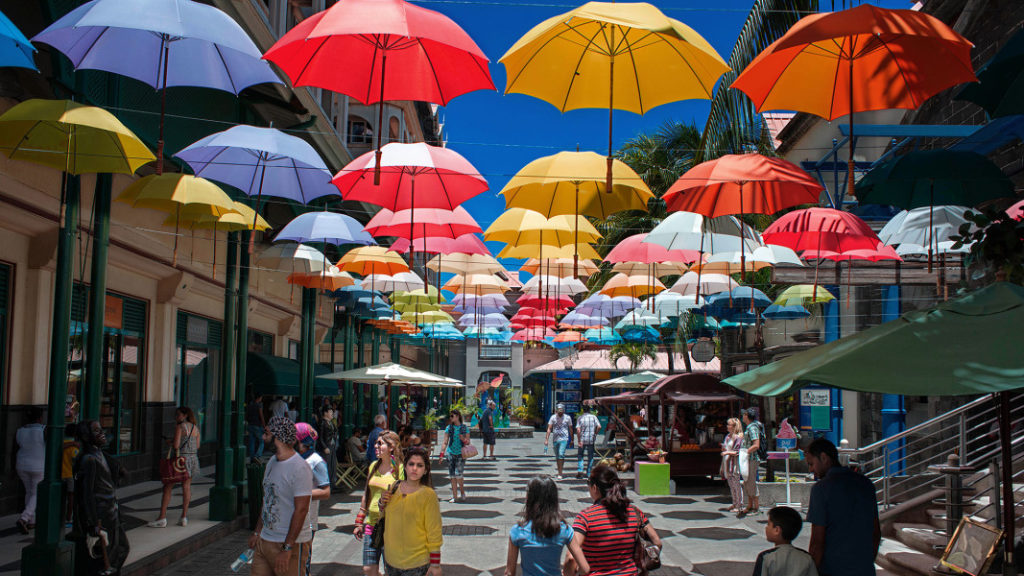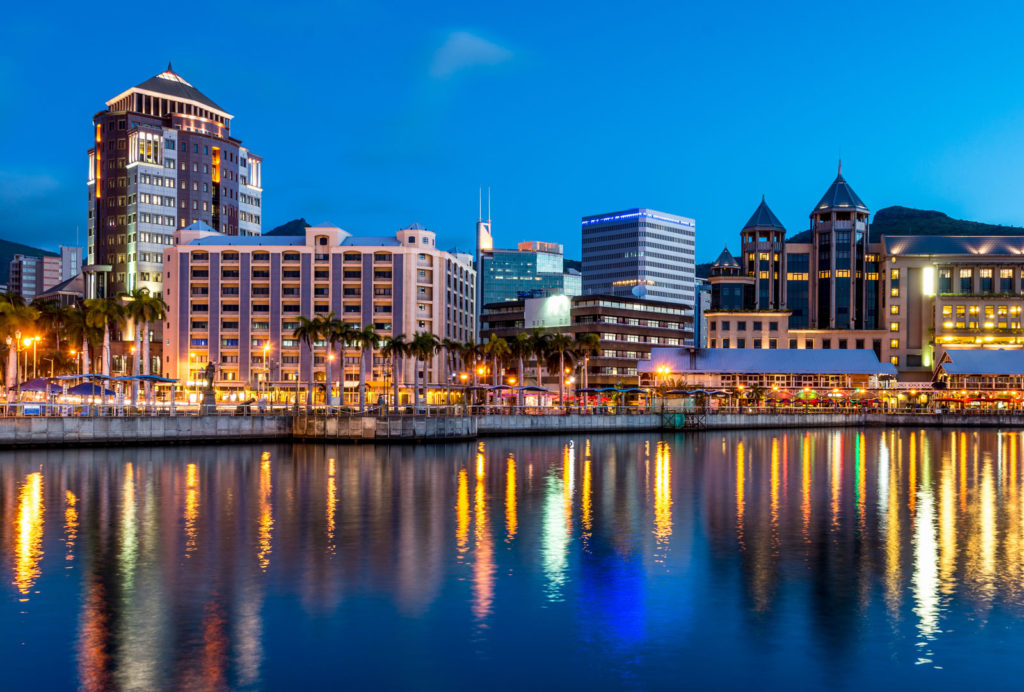“Port Louis was already in use as a harbor in 1638. In 1736, under French government, it became the administrative center of Mauritius and a major reprovisioning halt for French ships during their passage between Asia and Europe, around the Cape of Good Hope.”
 Mauritius, an island nation east of Madagascar off the southeast coast of Africa, gained independence in 1968. A stable democracy with regular free elections and a positive human rights record, the country has attracted considerable foreign investment and has earned one of Africa’s highest per capita incomes. Mauritius is divided into ten districts and three dependencies, and its capital is Port Louis. Its official language is English, and its currency is the Mauritian rupee (MUR). Since independence, Mauritius has developed from a low-income, agriculturally based economy to a middle-income, diversified economy with growing industrial, financial, and tourist sectors. For most of this period, annual growth has been in the order of 5% to 6%. This remarkable achievement has been reflected in more equitable income distribution, increased life expectancy, lowered infant mortality, and a much-improved infrastructure. The economy depends on tourism, textiles and apparel, and financial services, and is expanding into fish processing, information and communications technology, hospitality, and property development.
Mauritius, an island nation east of Madagascar off the southeast coast of Africa, gained independence in 1968. A stable democracy with regular free elections and a positive human rights record, the country has attracted considerable foreign investment and has earned one of Africa’s highest per capita incomes. Mauritius is divided into ten districts and three dependencies, and its capital is Port Louis. Its official language is English, and its currency is the Mauritian rupee (MUR). Since independence, Mauritius has developed from a low-income, agriculturally based economy to a middle-income, diversified economy with growing industrial, financial, and tourist sectors. For most of this period, annual growth has been in the order of 5% to 6%. This remarkable achievement has been reflected in more equitable income distribution, increased life expectancy, lowered infant mortality, and a much-improved infrastructure. The economy depends on tourism, textiles and apparel, and financial services, and is expanding into fish processing, information and communications technology, hospitality, and property development.
“The island nation aims to reinvent itself as a hub for global investors in Africa, with both China and India as its key partners. “
Who Can Invest in Mauritius?
 Foreign nationals or non-Mauritian citizens are allowed to work and/or live in Mauritius under three distinct and simply laid down schemes:
Foreign nationals or non-Mauritian citizens are allowed to work and/or live in Mauritius under three distinct and simply laid down schemes:
A: As a retired non-citizen, irrespective of age and nationality
B: As a professional
C: As an investor
A ‘Work & Live in Mauritius’ department has been set up within the Board of Investment “BOI” as a single-facing service counter to expedite formalities for individuals and investors setting up in Mauritius. Foreign nationals, investors and non-investors alike, may also buy freehold property in Mauritius under the provisions of two specially studied schemes, they are:
1: Integrated Resort Scheme (IRS)
Under the Integrated Resort Scheme (IRS), luxury villas and other residential properties can be sold freehold at a minimum price of U$D 500,000 to foreigners who, de facto, receive a residence permit. The few IRS villas put on the market so far have proven very popular.
The IRS targets the high-end segment of the international property market, i.e – high net-worth individuals with high purchasing power. The investor may sell the property with no minimum selling price restriction; rent the property, elect tax residency in Mauritius and is free to repatriate funds or revenue reaised from the sale or renting of the IRS property.
2: Real Estate Scheme (RES)
Under the Real Estate Scheme (RES), residential units are sold to non-citizens at no minimum price. However, acquisition of property worth at least U$D 500,000 entitles the purchaser a residence permit. This scheme is targeted mainly for those investors, retirees and professionals, who want to invest, work and live in Mauritius or for those individuals who want to have a second home or holiday retreat in Mauritius. (**Source: Mauritius Boar)
“Mauritius is actively attracting foreign investment and offers residency permits in exchange for property investment. By purchasing property worth at least $500,000, foreigners can qualify for the permit. There are also no capital gains, dividends, or inheritance tax in Mauritius.”
Why Invest In Mauritius?
The advantages of investing in Mauritius are:
– Social and political stability
– A strong and diversified economy
– An educated and bilingual workforce
– A pool of skilled and qualified professionals
– A business friendly environment
– Preferential access to international market
– A modern and reliable infrastructure
– A comprehensive and forward looking legal framework
– A growing international business and financial hub
– A safe and enjoyable place to work and live
A competitive business environment
Mauritius offers a low tax jurisdiction and an investor-friendly environment
to encourage local and foreign companies to set up a business.
– Harmonised corporate and income tax of 15%
– Tax free dividend
– No capital gains tax
– 100% foreign ownership
– Exemption from customs duty on equipment
– Free repatriation of profits, dividends and capital
– No minimum foreign capital required
– 50% annual allowance on declining balance for the purchase of electronic and computer equipment
**Source: Mauritius Board of Investment**

The economy is the start and end of everything. You can’t have successful education reform or any other reform if you don’t have a strong economy.
~ David Cameron

Contact us today with any questions!
hello@bracewellsestateagent.co.uk
020 8348 8080
